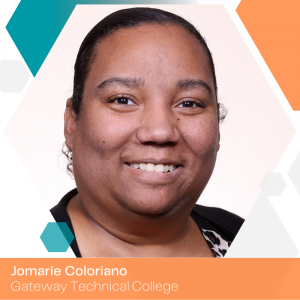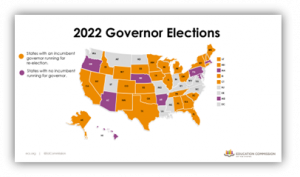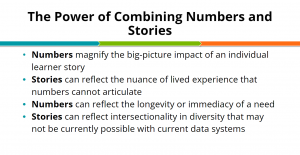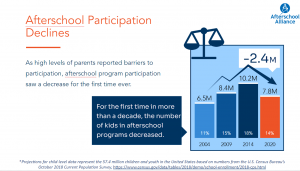The last two weeks, lawmakers in Congress have sought to pass temporary funding legislation intended to avoid a government shutdown. Elsewhere federal agencies have made changes to apprenticeship regulations and distributed new funds for teacher professional development and schools, while Congress celebrates Workforce Development Month.
 Congress Closes in on Temporary Funding Extension
Congress Closes in on Temporary Funding Extension
As shared previously, lawmakers in the House and Senate have not been able to reach consensus this year on the 12 individual spending bills that fund federal government operations and programs. As a result, lawmakers have been negotiating a continuing resolution (CR)—short-term legislation that simply extends current fiscal year 2022 (FY22) funding levels for a specific period of time. With the formal start of FY23 set to begin tomorrow (October 1), a CR will avert a government shutdown and related lapse in funding for federal programs like the Carl D. Perkins Career and Technical Education Act (Perkins V).
Late Monday evening, September 26, Senate Democrats published the text of a CR to extend current fiscal year 2022 (FY22) funding levels through December 16, 2022. The proposed legislation also includes additional emergency funding for a wide array of other pressing national priorities, such as recent natural disasters and the ongoing Russian invasion of Ukraine; a summary of the CR’s major provisions can be accessed here. As reported last week, Senator Joe Manchin (D-WV) had hoped to attach environmental permitting reform legislation to this package which was a primary source of contention for both sides seeking agreement. On Tuesday afternoon, Sen. Manchin dropped this request when it became clear there was not enough support in the chamber to include it in this legislative measure. Following these behind-the-scenes discussions, the Senate took a series of votes and ultimately passed this CR by a margin of 72-25.
This measure was passed by the House earlier today along party lines. The passage of the CR is one of the last agenda items for Congress before the upcoming midterm elections. Lawmakers will likely spend most of their time between now and the elections in home states and districts campaigning. Lawmakers must revisit FY23 funding in December by either passing another temporary spending bill or completing work on the annual budget. As these efforts continue, Advance CTE will continue to work with its partners on Capitol Hill to secure robust investments in CTE, including Perkins V’s basic state grant program and other CTE community federal funding priorities.
ED Distributes $1 Billion in Title IV-A Funding
This past summer, Congress approved a bipartisan gun and school safety package in response to several mass shootings that took place across the nation. Dubbed the Bipartisan Safer Communities Act (S. 2938), the legislation made a number of modest changes to gun policy including strengthening background checks for gun purchases to include a review of juvenile justice records for individuals under the age of 21. In addition, the legislation invested significant new funding into K-12 schools to assist with mental health efforts within communities. These funds include an additional $1 billion for Every Student Succeeds Act’s (ESSA) Title IV-A Student Support and Academic Enrichment grant program—specifically to help states and school districts foster safer and healthier learning environments in schools.
On September 29, the U.S. Department of Education (ED) disbursed these funds to states and issued a Dear Colleague letter to chief state school officers encouraging them to emphasize student social-emotional learning and mental health needs, engagement with students and families, and prioritizing funding to meet the needs of the nation’s most underserved learners with these newly authorized federal resources. More information about the initiative can be found here.
Lawmakers Designate September Workforce Development Month
Earlier this month, Sen. Dianne Feinstein (D-CA) introduced S. Res. 780—a measure designating September 2022 as “National Workforce Development Month.” The effort garnered bipartisan support from nearly a third of the Senate upon introduction and was recently considered and agreed to in the upper chamber. A companion resolution was also introduced in the House and sponsored and led by Rep. Bonamici (D-OR). These resolutions are intended to elevate workforce development efforts across the nation and draw attention to the importance of investing in related systems of skill development.
DOL Formally Rescinds IRAP Rules
Over the last few years, the U.S. Department of Labor (DOL) sought to create a parallel subset of apprenticeship programs known as “Industry Recognized Apprenticeship Programs” (IRAPs). Compared to registered apprenticeship programs (RAPs), IRAPS had relatively fewer programmatic requirements and would be recognized by third-party entities authorized by DOL (known as standards recognition entities or “SREs”). While IRAPs were formally launched under the previous presidential administration, relatively few programs were ever fully implemented. For this and many other reasons, DOL formally published a new rule this week rescinding IRAPs’ existing federal authorization. Existing IRAPs and SREs are “. . . encouraged to consider registering their programs with DOL or a State Apprenticeship Agency (SAA). Such entities are encouraged to reach out to the Apprenticeship Director in their State to receive technical assistance and explore such options further.”
OCTAE Launches Future Finder Challenge
Late last week, the U.S. Department of Education’s Office of Career, Technical, and Adult Education (OCTAE) announced a $1 million “Future Finder Challenge” to accelerate the development of tools and related technologies that can support career navigation efforts for adults. “Developing digital career navigation tools for adult learners will expand equitable access to career opportunities — which will increase upward mobility and strengthen the broader American workforce,” OCTAE’s Assistant Secretary Amy Loyd, Ed.L.D., said during the announcement which was also intended to celebrate National Adult Education and Family Literacy Week. The challenge is structured as an “open innovation invitation” to spur the development of services, products, and programs that can more effectively support individuals search for and navigate opportunities in the labor market. A related press release from the department can be found here.
ED Awards $60 Million for Teacher Pipeline Efforts
On September 27, the U.S. Department of Education announced that it had awarded $60 million in new grant funding for the Supporting Effective Educator Development (SEED) grant program. The SEED program is intended to support evidence-based efforts that “. . . prepare, develop, or enhance the skills of [k-12] educators.” This round of grantmaking awarded 22 three-year grants which, according to the Biden Administration, brings the FY22 total for additional support for teachers to $285 million. More information on this announcement can be accessed here.
Steve Voytek, Policy Advisor
 Kayla Brossett, Louisiana
Kayla Brossett, Louisiana Jomarie Coloriano, Wisconsin
Jomarie Coloriano, Wisconsin 




 With over 30 gubernatorial elections and legislative elections in all but four states, 2022 will likely lead to
With over 30 gubernatorial elections and legislative elections in all but four states, 2022 will likely lead to  This session featuring Advance CTE and Edge Research inspired attendees to amplify learner outcome data and testimonials to create impactful data stories. Attendees were reminded to be in the driver’s seat on creating data ‘headlines’’ and to be proactive in addressing assumptions others might make about data. First step routines were also provided, such as mapping schedules for quantitative and qualitative data collection, quantitative data reporting and qualitative data access opportunities and comparing timelines with storytelling opportunities.
This session featuring Advance CTE and Edge Research inspired attendees to amplify learner outcome data and testimonials to create impactful data stories. Attendees were reminded to be in the driver’s seat on creating data ‘headlines’’ and to be proactive in addressing assumptions others might make about data. First step routines were also provided, such as mapping schedules for quantitative and qualitative data collection, quantitative data reporting and qualitative data access opportunities and comparing timelines with storytelling opportunities.  Edge Research provided storytelling tips — one included creating three to five headlines that encompass a data point audiences might not expect, highlight the most urgent findings, and provide a call to action. It is important to humanize qualitative data through phrases such as ‘1 out of X families’ or ‘X number of children need Y’.
Edge Research provided storytelling tips — one included creating three to five headlines that encompass a data point audiences might not expect, highlight the most urgent findings, and provide a call to action. It is important to humanize qualitative data through phrases such as ‘1 out of X families’ or ‘X number of children need Y’.  Congress Closes in on Temporary Funding Extension
Congress Closes in on Temporary Funding Extension As part of its response to the coronavirus pandemic, the federal government provided a total of $280 billion for K–12 and postsecondary schools over three rounds of unprecedented investment into education. For perspective, $280 billion is 200 times the annual allocation for Strengthening Career and Technical Education for the 21st Century Act (Perkins V). The Elementary and Secondary School Emergency Relief Fund (ESSER I, II, III) portion of each of the three emergency response bills totaled $189 billion for a range of uses from education technology to building costs and staff salaries. While states and districts were given wide discretion on how to invest the money, there are time limits for the money to be spent.
As part of its response to the coronavirus pandemic, the federal government provided a total of $280 billion for K–12 and postsecondary schools over three rounds of unprecedented investment into education. For perspective, $280 billion is 200 times the annual allocation for Strengthening Career and Technical Education for the 21st Century Act (Perkins V). The Elementary and Secondary School Emergency Relief Fund (ESSER I, II, III) portion of each of the three emergency response bills totaled $189 billion for a range of uses from education technology to building costs and staff salaries. While states and districts were given wide discretion on how to invest the money, there are time limits for the money to be spent. In the coming months, Advance CTE will release a series of four briefs to share strategies put in place by the PDI states to advance postsecondary CTE data quality and use. The first brief explores how postsecondary CTE data can be used in support of state education and workforce goals, and features
In the coming months, Advance CTE will release a series of four briefs to share strategies put in place by the PDI states to advance postsecondary CTE data quality and use. The first brief explores how postsecondary CTE data can be used in support of state education and workforce goals, and features  The second brief advances a theory of change for centering learners in postsecondary CTE data collection and use, featuring the
The second brief advances a theory of change for centering learners in postsecondary CTE data collection and use, featuring the  Skills Verification in the Digital Age
Skills Verification in the Digital Age
